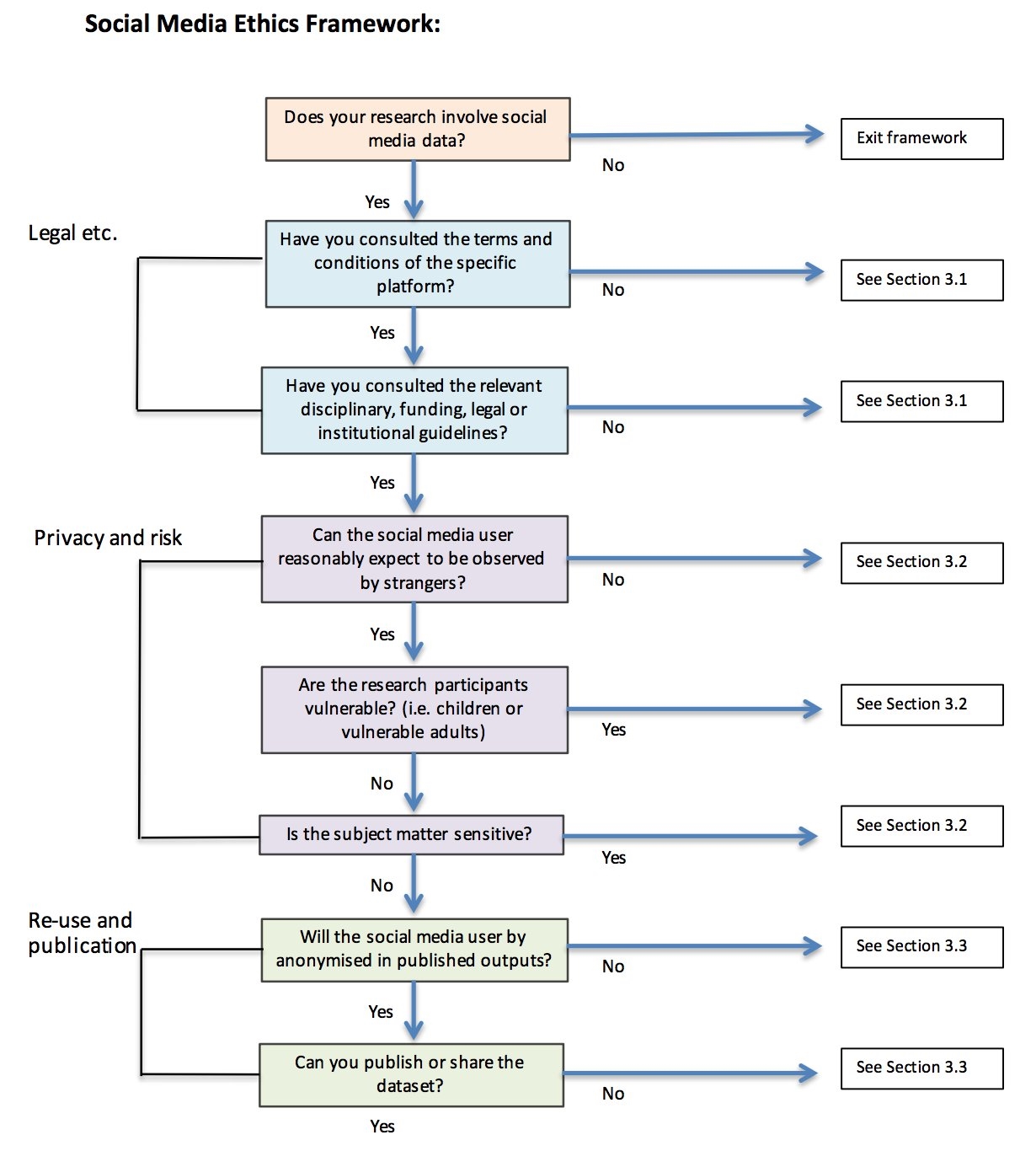Ethical issues in research using social media
Resources on the ethics of social media research
Social media refers to any online platform or channel that facilitates digital communication or interaction between users. Social media can be used for research activities both actively (e.g., recruiting or interacting with participants) or passively (e.g., data /web scaping).
Guidance from UKRIO
- Video: Gathering research data online: practical and ethical considerations. Dr Claire Hewson, Senior Lecturer in Psychology at The Open University, shares insights about gathering research data online: practical and ethical considerations. Gathering research data online: practical and ethical considerations. – YouTube
- Video: Social Media and Ethics. Dr Nicolas Gold, Associate Professor, University College London. The social media data landscape is complex, dynamic, and evolving. This means that it poses particular challenges to researchers wanting to undertake ethically defensible research. In this talk Dr Gold discusses these complexities, drawing out some key aspects that need to be addressed when considering the ethics of an intended investigation. He aimed to offer some principles and approaches for building ethical arguments in this space, drawing on foundational principles and recent research. He will also briefly highlight some key aspects in terms of specific platforms that may impact how researchers approach their investigations. Social Media and Ethics. – YouTube. To view the slides click here. *Please note for these slides: Except where otherwise licenced as shown, all material is Copyright © Nicolas Gold 2024, unauthorised reproduction is prohibited, and the ingestion and use of this material for training any kind of AI or other algorithmic model is strictly prohibited.
- Guidance document: Good practice in research: Internet-mediated research
From elsewhere
What is “social media data”?
Does it mean Facebook, Instagram, Twitter, blog sites, etc., i.e. a platform that needs a user name?
Social media definitions vary, but core components are user-generated content and the possibility of many-to-many communication: Julian Hopkins. How to Define Social Media – An Academic Summary. 2017 http://julianhopkins.com/how-to-define-social-media-an-academic-summary/
Definitions are also described in Cyberpsychology, Behavior, and Social Networking. 215-222. doi.org/10.1089/cyber.2020.0134
Guidance
- The Ethics Working Committee, from the Association of Internet Researchers, has produced three major reports to assist researchers in making ethical decisions in their research, which can be found here. https://aoir.org/ethics/
- Using Twitter Data in Research Guidance for Researchers and Ethics Reviewers. Dr Nicolas Gold, Department of Computer Science, UCL. using-twitt-research-v1.0 (ucl.ac.uk)
- Webinar: Research ethics issues with online data. Dr Nicolas Gold, Department of Computer Science, UCL (look at 4 minutes into the video) https://www.youtube.com/watch?v=2QkEXtsYQuU)
- Resource page from UKRI. https://www.ukri.org/councils/esrc/guidance-for-applicants/research-ethics-guidance/internet-mediated-research/
- Ethics case study from British Sociological Association. https://www.britsoc.co.uk/media/24899/using-twitter-for-criminology-research.pdf
- The British Psychological Society’s Supplementary guidance on the use of social media 2012 Ethics committee social media_Layout 1 (bps.org.uk)
- Ethical guidance on Social media research from the University of St Andrews. Social media research – Research – University of St Andrews (st-andrews.ac.uk)
- Guidance from the Data Culture Society entitled, Social Media Research, Ethical Guidance for Researchers Social Media Ethics Guidance for Researchers
- Guidance on the ethical considerations in research involving social media from the University of Wolverhampton. https://www.wlv.ac.uk/media/departments/research/documents/Ethical-Considerations-in-Research-Involving-Social-Media.docx
Using data from the internet and social media in research: ethics & consent. LSE Research Ethics Committee. https://info.lse.ac.uk/staff/divisions/research-and-innovation/research/Assets/Documents/PDF/ethics-Using-internet-and-Social-media-data-v8.pdf
Using social media in user research: Ethical considerations and constraints when using social media for user research. Department for Education, UK Government. https://user-research.education.gov.uk/guidance/ethics-and-safeguarding/using-social-media-in-user-research
- Social Media Research: A Guide to Ethics. Dr Leanne Townsend and Prof. Claire Wallace. https://www.gla.ac.uk/media/Media_487729_smxx.pdf
A Social Media Ethics Framework from the Glasgow guide is shown below:
Further reading:
- Hemphill, L., Schöpke-Gonzalez, A., & Panda, A. (2022). Comparative sensitivity of social media data and their acceptable use in research. Sci Data. 9(1):643. doi: 10.1038/s41597-022-01773-w
- Mahoney, J., Le Louvier, K., Lawson, S., Bertel, D., & Ambrosetti, E. (2022). Ethical considerations in social media analytics in the context of migration: lessons learned from a Horizon 2020 project. Research Ethics, 18(3), 226–240. https://doi.org/10.1177/17470161221087542
- Samuel, G., & Buchanan, E. (2020). Guest Editorial: Ethical Issues in Social Media Research. Journal of Empirical Research on Human Research Ethics. 15(1-2):3-11. doi:10.1177/1556264619901215
- Samuel, G, Derrick, G.E., & van Leeuwen, T. (2019). The Ethics Ecosystem: Personal Ethics, Network Governance and Regulating Actors Governing the Use of Social Media Research Data. Minerva. Sep;57(3):317-343. doi: 10.1007/s11024-019-09368-3
- Takats, C., Kwan, A., Wormer, R., Goldman, D., Jones, H.E., & Romero, D. (2022). Ethical and Methodological Considerations of Twitter Data for Public Health Research: Systematic Review. J Med Internet Res. 2022 Nov 29;24(11):e40380. doi: 10.2196/40380.
Last revised November 2024.
Please note that this list of resources is not intended to be exhaustive and should not be seen as a substitute for advice from suitably qualified persons. UKRIO is not responsible for the content of external websites linked to from this page. If you would like to seek advice from UKRIO, information on our role and remit and on how to contact us is available here.
UKRIO would like to thank our Advisory Community for their help in putting this list together.

